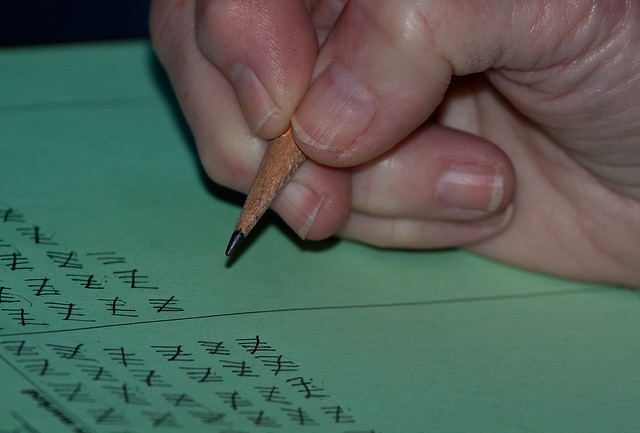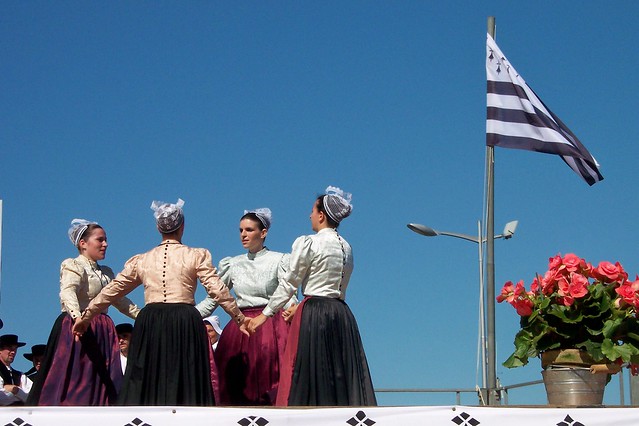Today we’re looking at words for magic, spells, charms, prayers and related things in Celtic languages.

| Proto-Celtic |
*brixtā = spell, magical formula, incantation |
| Celtiberian |
*bruxtia |
| Gaulish |
brixtia |
| Old Irish (Goídelc) |
bricht = charm, spell, incantation |
| Middle Irish (Gaoidhealg) |
bricht = incanation, charm, magic spell |
| Irish (Gaeilge) |
briocht = charm, spell, amulet
briocht sí = fairy charm
briocht a chanadh = to chant a spell
briocht draíochta = magic spell |
| Proto-Brythonic |
*briθ [ˈbriːθ] = charm, incantation |
| Middle Welsh (Kymraec) |
lleturith, lledrith, ledryth = magic, spell, charm, enchantment
llethrithawc, lledrithyawc, lleturithawc = magic, magical, enchanted |
| Welsh (Cymraeg) |
lled(f)rith = magic, spell, charm, enchantment; apparition, spectre, phantom; illusion, delusion, fantasy, imagination
lledrithaid = pretence, dissembling, deception
lledrithiaf, lledrithio = to counterfeit, fake, pretend, simulate
lledrithiog = magic, magical, enchanted |
| Old Breton |
brith = charm, incantation (?) |
| Breton (Brezhoneg) |
bre = incantation, magic |
Etymology: from the Proto-Indo-European *bʰerHǵ- (enlighten). Words that probably come from the same Proto-Celtic root, via the Celtiberian *bruxtia, include bruja (witch, crone, hag, owl) in Spanish, bruxa (witch, hex) in Galician, bruxa (witch) in Portuguese, and bruixa (witch) in Catalan [source].
| Old Irish (Goídelc) |
druídecht, draídecht = magic, wizardry, secret lore and arts of the druids |
| Middle Irish (Gaoidhealg) |
druídecht, draídecht, dráoidheachd = secret lore and arts of the druids, occult science, wizardry |
| Irish (Gaeilge) |
dríocht [ˈd̪ˠɾˠihaxt̪ˠə] = druidic art, druidism, witchcraft, magic, charm, enchantment
draíochtach = magical, bewitching, entrancing
draíochtúil = magic, magical |
| Scottish Gaelic (Gàidhlig) |
draoidheachd [drɯjəxg] = magic, socery, druidism
eun-draoidheachd = augury
slat-draoidheachd = magic wand/td> |
| Manx (Gaelg) |
druaight = charm, druid
druaightagh = charmer, charming, druid, magician, occult
druaightys = charming, druid, druidism, magic
fo druaight = charmed |
| Welsh (Cymraeg) |
derwyddiaeth [dɛrˈwəðjaɨ̯θ/dɛrˈwəðjai̯θ] = druidism, the druid cult |
| Cornish (Kerneweg) |
drewydhieth = druidism |
| Breton (Brezhoneg) |
drouizelezh / drouiziezh = druidism |
Etymology: these words come from the same roots as words for druid.
| Old Irish (Goídelc) |
ortha = prayer, incantation, spell, charm
oráit = prayer |
| Middle Irish (Gaoidhealg) |
ortha, órtha = prayer, incantation, spell, charm
orthanach = of prayers, wont to pray
oróit, oráit, oráid, oraoid = prayer, speech, oration
anoráit, anóráid = curse |
| Irish (Gaeilge) |
ortha = incantation, spell, charm, prayer
im ortha = unsalted butter used in charm-cure
óráid = oration, speech, address
óráideach = oratorical, declamatory.
óráidí = orator, speech-maker
óráidíocht = oratory, speech-making |
| Scottish Gaelic (Gàidhlig) |
ortha [ɔr̪ˠə] = incantation, (magical) prayer, amulet
ortha-bhàis = death incantation
ortha-ghràidh = love amulet / charm
òraid [ɔːrɪdʲ] = address, speech, lecture, talk
òraidiche [ɔːrɪdʲɪçə] = lecturer, orator, speechmaker
òraidearachd = oratory
talla-òraid = lecture hall / theatre |
| Manx (Gaelg) |
oraid = address, oration, speech
oraatagh = orator, speaker, oratorial
oraataght = oration |
| Proto-Brythonic |
*arọd = prayer, oration |
| Old Welsh (Kembraec) |
araut = speech, language, eloquence, address, oration |
| Middle Welsh (Kymraec) |
araỽd, arawt, araỽt, arawd = speech, language, eloquence, address, oration |
| Welsh (Cymraeg) |
arawd = speech, language, eloquence, address, oration, utterance, report, eulogy, prayer
arawduriaeth = oratory, rhetoric |
| Middle Cornish (Cernewec) |
areth = speech, oration |
| Cornish (Kerneweg) |
areth = lecture, oration, speech
arethek = rhetorical
arethor, arethores = lecturer, orator, speaker
arethva = platform
arethya = to lecture |
Etymology: from Latin ōrātiō (speech, discourse, language, oration), from ōrō (to speak as an orator, plead, pray) from Latin ōs, ōris (mouth), or from Proto-Indo-European *h₂er- (to pronounce a ritual) [source].
The words for prayer and oration come from this Latin root, and the words for charm and incantation may do as well [source]. The Brythonic words come via Vulgar Latin *arātiō [source].
Words from the same roots include oration in English, oración (oration, sentence, clause, prayer) in Spanish, and oratorio (oratory, oratorio, oratorical, solemn) in Italian.
| Old Irish (Goídelc) |
sén = blessing, charm, incantation, omen, prosperity, sign, snare
sénaid = to bless, charm (with spell), deny, reject, repudiate, sign |
| Middle Irish (Gaoidhealg) |
sén, seon, seún, sena, séna = sign, omen, augury, portent, incantation, charm, blessing, good luck, prosperity, happiness
sénaid, seanaidh = to mark with a sign, bless, put a spell on, put a charm on |
| Irish (Gaeilge) |
séan [ʃeːnˠ] = sign, omen, good luck, prosperity; to mark with a sign, to bless
séanaire = diviner, augur
séanaireacht = divination, augury |
| Scottish Gaelic (Gàidhlig) |
seun [ʃiən] = charm, magic invocation, protective spell
seunach [ʃiənəx] = charming, enchanting, charm-like
seunadair [ʃiənədɪrʲ] = enchanter
seunadaireachd [ʃiənədɪrʲəxg] = conjuring, enchanting
seunail [ʃiənal] = charmed, magical, happy, prosperous
seunmhorachd [ʃiənvərəxg] = magical power(s)
seunta [ʃiən̪ˠdə] = charmed, enchanted
seuntachan [ʃiəndəxan] = charm, enchantment |
| Manx (Gaelg) |
sheean = charm, fortune |
| Proto-Brythonic |
*suɨɣn = spell, incantation (?) |
| Middle Welsh (Kymraec) |
swyn, suen, = spell, incantation, sorcery, witchcraft, magic, remedy, charm
swyno, suyno = to charm, fascinate, allure, cast a spell (on), bewitch
swynedig, sỽynedic, swynedic = charmed, fascinated, charming, bewitched, blessed, happy |
| Welsh (Cymraeg) |
swyn [suːɨ̯n / sʊi̯n] = spell, incantation, sorcery, witchcraft, magic, remedy, charm
swyn(i)o = to charm, fascinate, allure, cast a spell (on), bewitch, divine, bless, protect
swynaidd = charming, enchanting
swynedig = charmed, fascinated, charming, bewitched, blessed, happy
swynwr, swynydd = sorcerer, magician, bewitcher, soothsayer
swynyddiaeth = sorcery, witchcraft, magic |
| Middle Cornish (Cernewec) |
sona, sone = to bless, hallow, sanctify, consecrate, charm
zona = to charm, hallow |
| Cornish (Kerneweg) |
sona = to bless, charm
sonell = charm |
| Breton (Brezhoneg) |
saouzan = disorientation, bewilderment, stupor, hypnosis
saouzanan, saouzanañ = to disorientate, hypnotise, go astray, misplace
saouzanidigezh = hypnotism
saouzanus = hypnotic |
Etymology: from Latin signum (sign, mark, signal, miracle), from Proto-Italic *seknom (sign, statue), from Proto-Indo-European *sek- (to cut) or *sekʷ- (to follow). [source].
Words from the same roots include sign and signal in English, seña (sign, indication, gesture) and sino (destiny, fate, lot) in Spanish, and Segen (blessing) in German [source].
| Proto-Celtic |
*soitos. *soyto- = magic |
| Proto-Brythonic |
*hʉd = magic, charm
hʉdol = charming, illusory |
| Middle Welsh (Kymraec) |
hut, hud = magic, wizardry, sorcery, witchcraft
hûdadwy, hydadwy = persuasive, enticing, seducible |
| Welsh (Cymraeg) |
hud [hɨːd/hiːd] = magic, wizardry, sorcery, witchcraft, spell, enchantment, charm, fascination, allurement, persuasion
hudadwy = persuasive, enticing, seducible
hudaf, hudo = to fashion or produce by magic, conjure, cast a spell upon, enchant, charm, entice, allure, persuade, seduce, beguile
hudaidd = alluring, charming, seductive
hudol = charming, enchanting, enticing, alluring, illusory, deceptive, deceitful |
| Old Cornish |
hudol = charming, illusory |
| Middle Cornish (Cernewec) |
huder = a deceiver, hypocritic, juggler, sorcerer
hudol = sorcerer |
| Cornish (Kerneweg) |
hus = charm, enchantment, illusion, magic, sorcery, spell
husa = to charm, create an illusion, enchant |
| Middle Breton (Brezonec) |
hud = magic
hudek, hudel = magic, magical
hudiñ = to charm, enchant, bewitch, delight
hudour = magician, wizard
hudouriezh = magic |
| Breton (Brezhoneg) |
hud = magic
hudek = magic, magical
hudour = magician, wizard |
Etymology: from the Proto-Indo-Etymology *sh₂oy-tó-s (magic), from *sh₂ey (to bind, fetter) [source]. Words from the same PIE roots include seiður (magic, witchcraft, sorcery) in Icelandic, sejd (sorcery, witchcraft, magic potion) in Swedish, and seid (magic) in Norwegian [source].
| Middle Irish (Gaoidhealg) |
pis(e)óc = charm, spell, sorcery, witchcraft |
| Irish (Gaeilge) |
piseog = charm, spell, superstition
piseogach = practising charms or spells, superstitious
piseogacht = superstitious practices
piseogaí = charm-setter, superstitious person |
| Scottish Gaelic (Gàidhlig) |
pisreag [ʃiən] = charm, spell, ensorcellment, sorcery, superstition |
| Manx (Gaelg) |
pishag = charm, incantation, spell, witchcraft
pishagagh = incantatory, magical, sorcerer, superstitious
pishagys = enchantment, magic |
| Middle Cornish (Cernewec) |
pystyc = witchery, magic, sorcery
pystry = witchcraft, magic, sorcery |
| Cornish (Kerneweg) |
pystri = magic, sorcery
pystrier = sorcerer, warlock, wizard
pystriores = sorcereress |
Etymology: probably from Latin pyxis (a small box, for holding medicines or toiletries), from Ancient Greek πυξίς (puxís – box, tablet, cylinder), from πῠ́ξος (púxos – boxwood) [source]. The Hibero-English word piseog (an evil spell, curse) comes from the same roots, via Irish [source].
| Old Irish (Goídelc) |
airnigde [ˈar͈ʲn͈ʲiɣʲðʲe] = prayer, praying
ar·neget = to pray |
| Middle Irish (Gaoidhealg) |
airnigde, airnaigde, airna(i)gthe, urnaidhi, urnaith = praying, prayer
airnaigid, ernaigit = to pray
airnaigthech, ernaigtech, urnaigtheach = prayerful, devout |
| Irish (Gaeilge) |
urnaí [uːɾˠˈn̪ˠiː / ˈʌɾˠn̪ˠi] = praying, prayer
urnaitheach = prayful, devout |
| Scottish Gaelic (Gàidhlig) |
ùrnaigh [ur̪ˠn̪ʲɪ] = praying, prayer
ùrnaigheach [ur̪ˠn̪ʲijəx] = pertaining to or abounding in prayers |
| Manx (Gaelg) |
yeearree = prayer, request, urge, wish, desire, aspiration; to solicit, importune
yeearreeagh = wistful, soliciting, yearning |
Etymology: uncertain [source].
| Middle Irish (Gaoidhealg) |
paitir, paidear = the Lord’s Prayer, paternoster |
| Irish (Gaeilge) |
paidir [ˈpˠɑdʲəɾʲ / ˈpˠædʲəɾʲ] = Paternoster, prayer
An Phaidir, Paidir an Tiarna = the Lord’s Prayer
paidreoireacht = praying
paidrín = Rosary |
| Scottish Gaelic (Gàidhlig) |
paidir [padʲɪrʲ] = the Lord’s Prayer, Pater Noster, rosary |
| Manx (Gaelg) |
padjer [ˈpaːʒər] = prayer, devotion
Padjer y Çhiarn = the Lord’s Prayer
goaill padjer = to pray, prayer |
Etymology: from Latin pater (father), the first word of the Lord’s Prayer in Latin (Pater noster) [source].

Sources: Wiktionary, Am Faclair Beag, Online Manx Dictionary, Teanglann.ie, eDIL – Electronic Dictionary of the Irish Language, In Dúil Bélrai English – Old Irish glossary, Geiriadur Prifysgol Cymru, Gerlyver Kernewek, Dictionaire Favereau, TermOfis, English – ProtoCeltic WordList (PDF), Etymological Dictionary Of Proto Celtic












